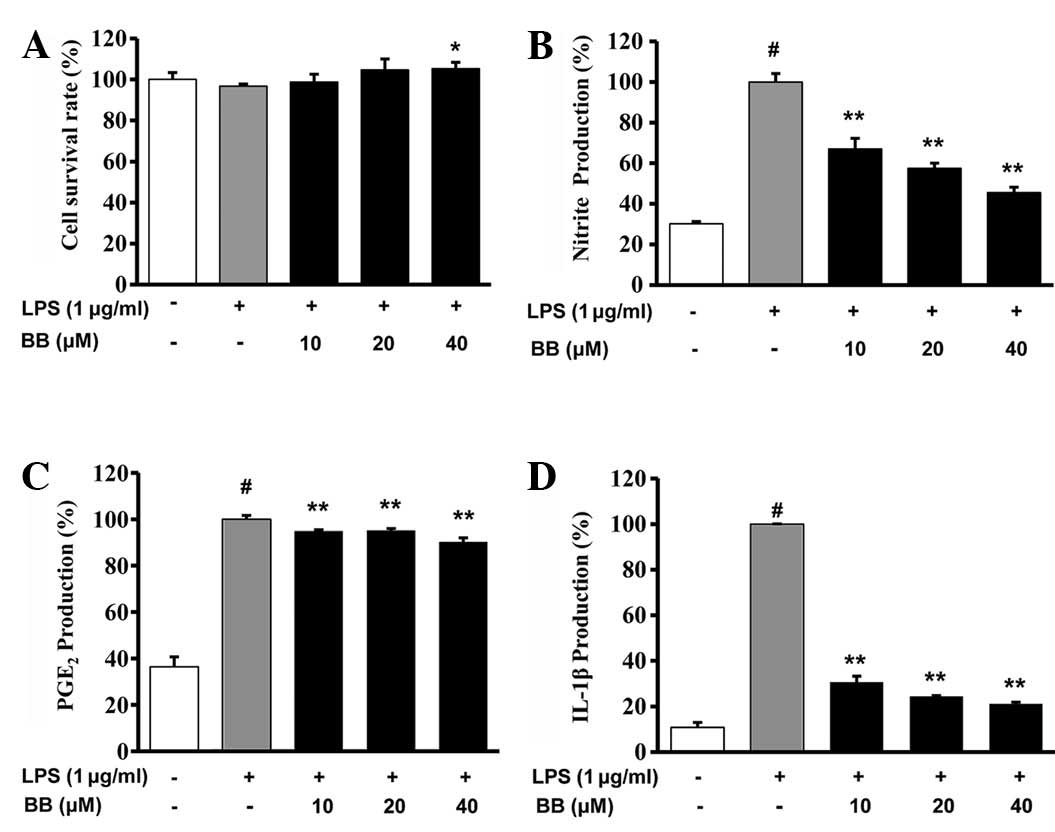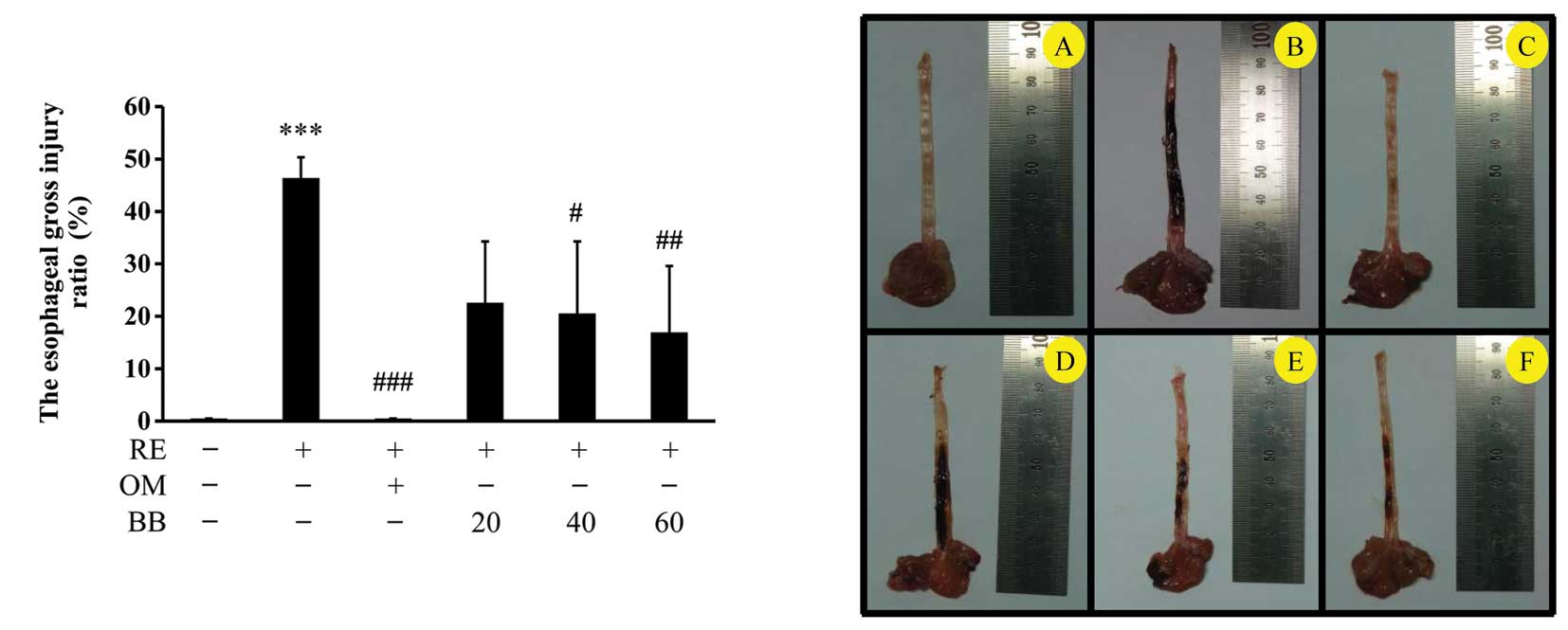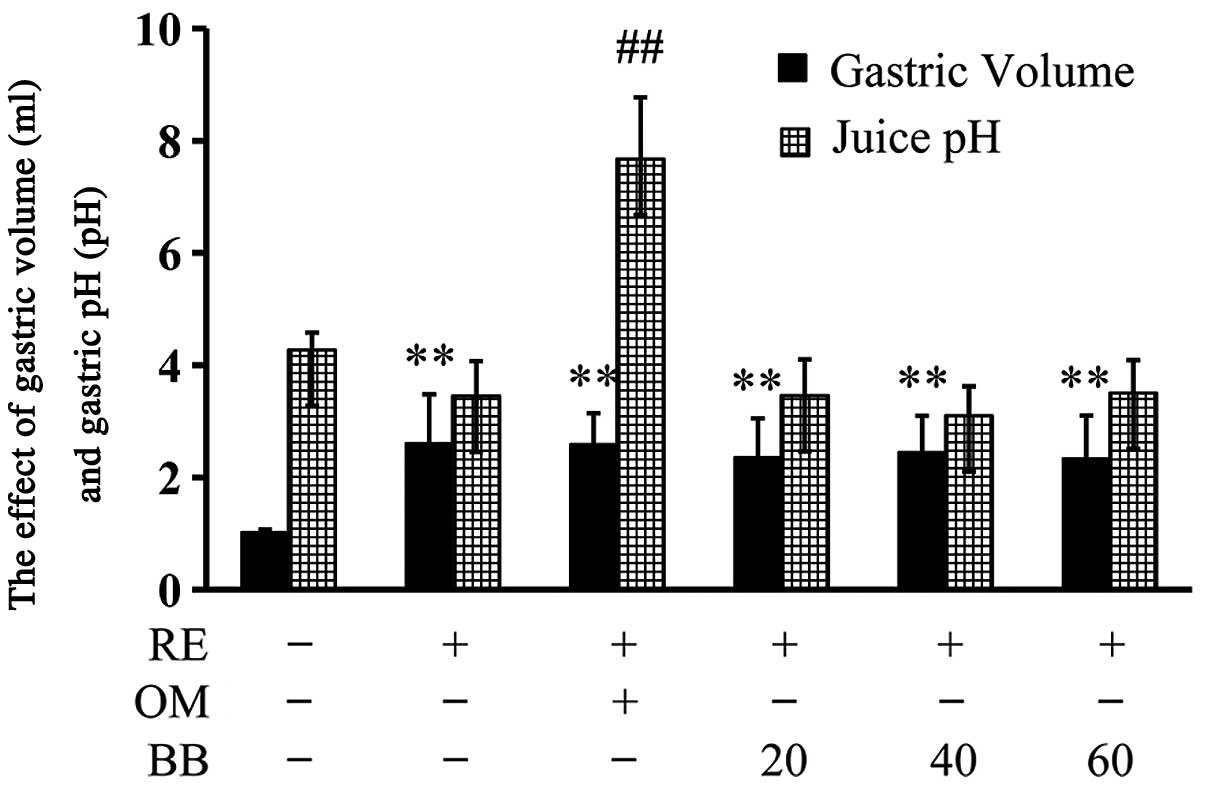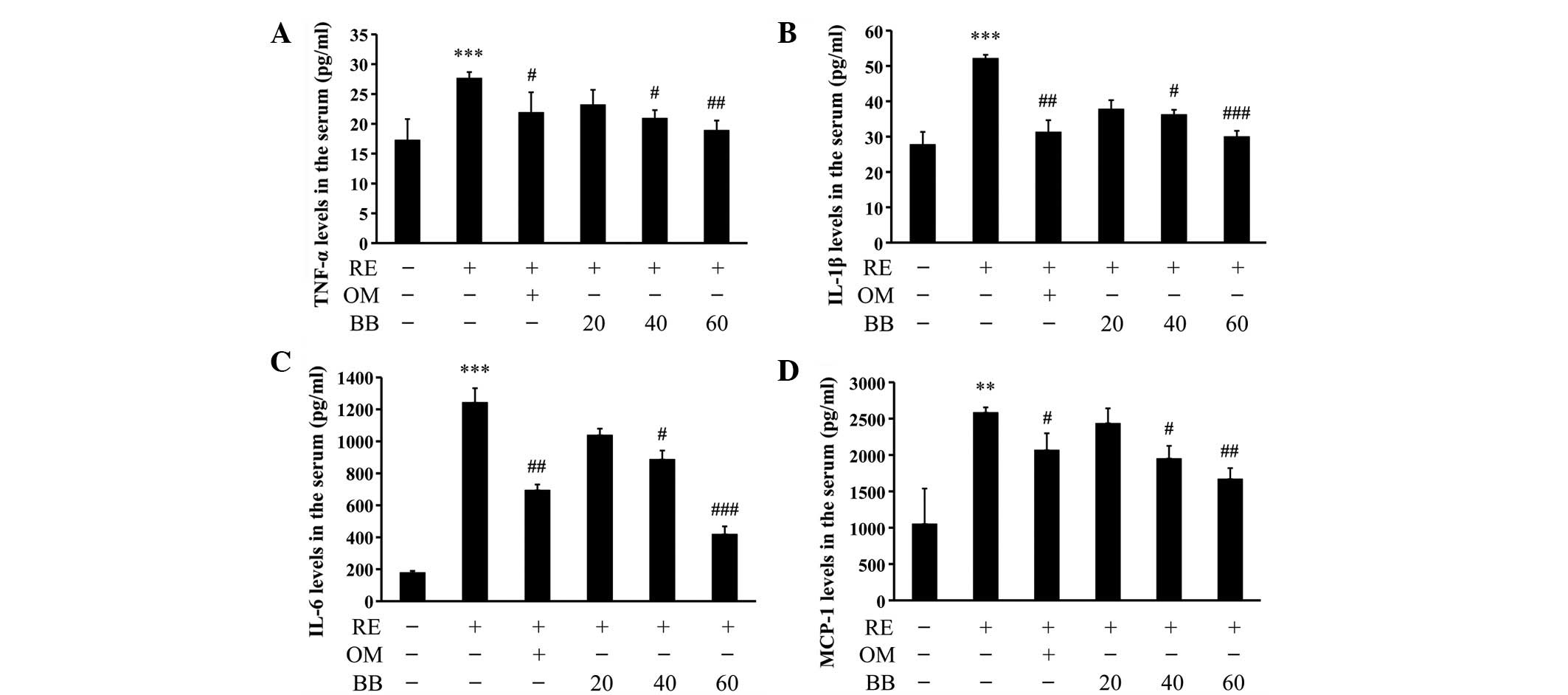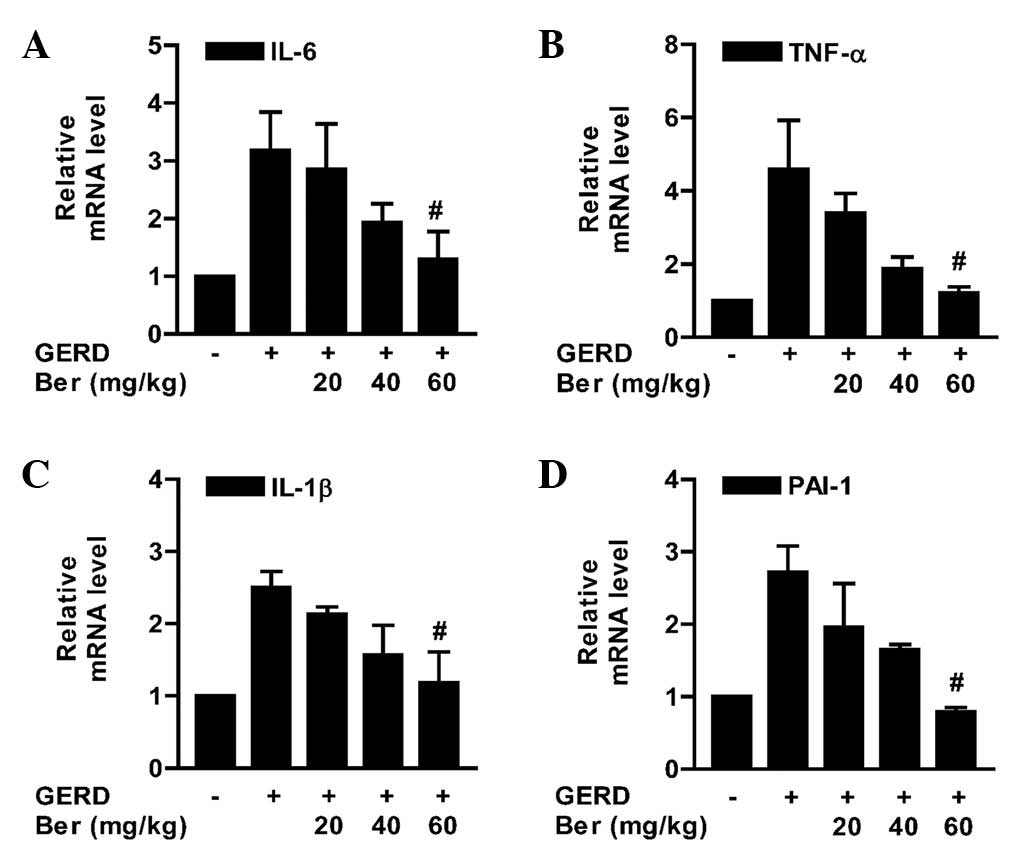|
1
|
Mahattanadul S, Ridtitid W, Nima S,
Phdoongsombut N, Ratanasuwon P and Kasiwong S: Effects of
Morinda citrifolia aqueous fruit extract and its biomarker
scopoletin on reflux esophagitis and gastric ulcer in rats. J
Ethnopharmacol. 134:243–250. 2011.
|
|
2
|
Fujiwara Y, Higuchi K, Hamaguchi M,
Takashima T, Watanabe T, Tominaga K, Oshitani N, Matsumoto T and
Arakawa T: Increased expression of transforming growth factor-alpha
and epidermalgrowthfactor receptors in rat chronic reflux
esophagitis. J Gastroenterol Hepatol. 19:521–517. 2004. View Article : Google Scholar : PubMed/NCBI
|
|
3
|
Yoshida N: Inflammation and oxidative
stress in gastroesophageal reflux disease. J Clin Biochem Nutr.
40:13–23. 2007. View Article : Google Scholar : PubMed/NCBI
|
|
4
|
Labenz J, Blum AL, Bayendörffer E, Meining
A, Stolte M and Börsch G: Curing Helicobacter pylori
infection in patients with duodenal ulcer disease may provoke
reflux esophagitis. Gastroenterology. 112:1442–1447. 1997.
|
|
5
|
Varanasi RV, Fantry GT and Wilson KT:
Decreased prevalence of Helicobacter pylori infection in
gastroesophageal reflux disease. Helicobacter. 3:188–194. 1998.
|
|
6
|
Haruma K, Hamada H, Mihara M, Kamada T,
Yoshihara M, Sumii K, Kajiyama G and Kawanishi M: Negative
associated between Helicobacter pylori infection and reflux
esophagitis in older patients: case-control study in Japan.
Helicobacter. 5:24–29. 2000.
|
|
7
|
Shin JM and Kim N: Pharmacokinetics and
pharmacodynamics of the proton pump inhibitors. J
Neurogastroenterol Motil. 19:25–35. 2013. View Article : Google Scholar : PubMed/NCBI
|
|
8
|
Carling L, Axelsson CK, Forssell H,
Stubberöd A, Kraglund K, Bonnevie O and Ekström P: Lansoprazole and
omeprazole in the prevention of relapse of reflux oesophagitis: a
long-term comparative study. Aliment Pharmacol Ther. 12:985–990.
1998. View Article : Google Scholar : PubMed/NCBI
|
|
9
|
Youssef SS, Iskandar SB, Scruggs J and Roy
TM: Acute pancreatitis associated with omeprazole. Int J Clin
Pharmacol Ther. 43:558–561. 2005. View
Article : Google Scholar : PubMed/NCBI
|
|
10
|
Katz PO: Optimizing medical therapy for
gastroesophageal reflux disease: state of the art. Rev
Gastroenterol Disord. 3:59–69. 2003.PubMed/NCBI
|
|
11
|
Lahiri S, Singh P, Singh S, Rasheed N,
Palit G and Pant KK: Melatonin protects against experimental reflux
esophagitis. J Pineal Res. 46:207–213. 2009. View Article : Google Scholar : PubMed/NCBI
|
|
12
|
Colin-Jones DG: Histamine-2-receptor
antagonists in gastro- oesophageal reflux. Gut. 30:1305–1308. 1989.
View Article : Google Scholar : PubMed/NCBI
|
|
13
|
Doornebal J, Bijlsma R and Brouwer RM: An
unknown but potentially serious side effect of proton pump
inhibitors: hypomagnesaemia. Ned Tijdschr Geneeskd.
153:A7112009.(In Dutch).
|
|
14
|
Ku SK, Kim JS, Seo YB, et al: Effect of
Curculigo orchioides on reflux esophagitis by suppressing
proinflammatory cytokines. Am J Chin Med. 40:1241–1255. 2012.
|
|
15
|
Compare D, Pica L, Rocco A, De Giorgi F,
Cuomo R, Sarnelli G, Romano M and Nardone G: Effects of long-term
PPI treatment on producing bowel symptoms and SIBO. Eur J Clin
Invest. 41:380–386. 2011. View Article : Google Scholar : PubMed/NCBI
|
|
16
|
Allescher HD and Wagner H: STW
5/Iberogast: multi-target-action for treatment of functional
dyspepsia and irritable bowel syndrome. Wien Med Wochenschr.
157:301–307. 2007.(In German).
|
|
17
|
Wang XH, Jiang SM and Sun QW: Effects of
berberine on human rheumatoid arthritis fibroblast-like
synoviocytes. Exp Biol Med (Maywood). 236:859–866. 2011. View Article : Google Scholar : PubMed/NCBI
|
|
18
|
Lou T, Zhang Z, Xi Z, Liu K, Li L, Liu B
and Huang F: Berberine inhibits inflammatory response and
ameliorates insulin resistance in hepatocytes. Inflammation.
34:659–667. 2011. View Article : Google Scholar : PubMed/NCBI
|
|
19
|
Kuo CL, Chi CW and Liu TY: The
anti-inflammatory potential of berberine in vitro and in vivo.
Cancer Lett. 203:127–137. 2004. View Article : Google Scholar : PubMed/NCBI
|
|
20
|
Jeong HW, Hsu KC, Lee JW, Ham M, Huh JY,
Shin HJ, Kim WS and Kim JB: Berberine suppresses proinflammatory
responses through AMPK activation in macrophages. Am J Physiol
Endocrinol Metab. 296:E955–E964. 2009. View Article : Google Scholar : PubMed/NCBI
|
|
21
|
Lu DY, Tang CH, Chen YH and Wei IH:
Berberine suppresses neuroinflammatory responses through
AMP-activated protein kinase activation in BV-2 microglia. J Cell
Biochem. 110:697–705. 2010. View Article : Google Scholar : PubMed/NCBI
|
|
22
|
Wang Q, Zhang M, Liang B, Shirwany N, Zhu
Y and Zou MH: Activation of AMP-activated protein kinase is
required for berberine-induced reduction of atherosclerosis in
mice: the role of uncoupling protein 2. PLoS One. 6:e254362011.
View Article : Google Scholar : PubMed/NCBI
|
|
23
|
Shang W, Liu J, Yu X and Zhao J: Effects
of berberine on serum levels of inflammatory factors and
inflammatory signaling pathway in obese mice induced by high fat
diet. Zhongguo Zhong Yao Za Zhi. 35:1474–1477. 2010.(In
Chinese).
|
|
24
|
Shen YB, Piao XS, Kim SW, Wang L and Liu
P: The effects of berberine on the magnitude of the acute
inflammatory response induced by Escherichia coli
lipopolysaccharide in broiler chickens. Poult Sci. 89:13–19. 2010.
View Article : Google Scholar : PubMed/NCBI
|
|
25
|
Singh P, Singh N and Palit G: Analysing
the role of COX-2 in acute oesophagitis and in melatonin-exerted
protection against experimental reflux oesophagitis in rats. J
Pharm Pharmacol. 63:1572–1580. 2011. View Article : Google Scholar : PubMed/NCBI
|
|
26
|
US Environmental Protection Agency. Health
Effects Test Guidelines OPPTS 870.100. Washington: US EPA; 2012
|
|
27
|
McAdam E, Haboubi HN, Forrester G, Eltahir
Z, Spencer-Harty S, Davies C, Griffiths AP, Baxter JN and Jenkins
GJ: Inducible nitric oxide synthase (iNOS) and nitric oxide (NO)
are important mediators of reflux-induced cell signalling in
esophageal cells. Carcinogenesis. 33:2035–2043. 2012. View Article : Google Scholar : PubMed/NCBI
|
|
28
|
Lee CH, Chen JC, Hsiang CY, Wu SL, Wu HC
and Ho TY: Berberine suppresses inflammatory agents-induced
interleukin-1beta and tumor necrosis factor-alpha productions via
the inhibition of IkappaB degradation in human lung cells.
Pharmacol Res. 56:193–201. 2007. View Article : Google Scholar
|
|
29
|
Choi BH, Ahn IS, Kim YH, Park JW, Lee SY,
Hyun CK and Do MS: Berberine reduces the expression of adipogenic
enzymes and inflammatory molecules of 3T3-L1 adipocyte. Exp Mol
Med. 38:599–605. 2006. View Article : Google Scholar : PubMed/NCBI
|
|
30
|
Xiao HB, Sun ZL, Zhang HB and Zhang DS:
Berberine inhibits dyslipidemia in C57BL/6 mice with
lipopolysaccharide induced inflammation. Pharmacol Rep. 64:889–895.
2012. View Article : Google Scholar : PubMed/NCBI
|
|
31
|
Jia L, Liu J, Song Z, Pan X, Chen L, Cui X
and Wang M: Berberine suppresses amyloid-beta-induced inflammatory
response in microglia by inhibiting nuclear factor-kappaB and
mitogen-activated protein kinase signalling pathways. J Pharm
Pharmacol. 64:1510–1521. 2012.
|
|
32
|
Yan F, Wang L, Shi Y, et al: Berberine
promotes recovery of colitis and inhibits inflammatory responses in
colonic macrophages and epithelial cells in DSS-treated mice. Am J
Physiol Gastrointest Liver Physiol. 302:G504–G514. 2012. View Article : Google Scholar : PubMed/NCBI
|
|
33
|
Jeong HW, Hsu KC, Lee JW, Ham M, Huh JY,
Shin HJ, Kim WS and Kim JB: Berberine suppresses proinflammatory
responses through AMPK activation in macrophages. Am J Physiol
Endocrinol Metab. 296:E955–E964. 2009. View Article : Google Scholar : PubMed/NCBI
|
|
34
|
Yoon HD, Jeong EJ, Choi JW, Lee MS, Park
MA, Yoon NY, Kim YK, Cho DM, Kim JI and Kim HR: Anti-inflammatory
effects of ethanolic extracts from Codium fragile on
LPS-stimulated RAW 264.7 macrophages via nuclear factor kappaB
inactivation. Fish Aquat Sci. 14:267–274. 2011.
|
|
35
|
Rodríguez-Hernández H, Simental-Mendía LE,
Rodríguez-Ramírez G and Reyes-Romero MA: Obesity and inflammation:
epidemiology, risk factors, and markers of inflammation. Int J
Endocrinol. 2013:6781592013.PubMed/NCBI
|
|
36
|
Rieder F, Biancani P, Harnett K, Yerian L
and Falk GW: Inflammatory mediators in gastroesophageal reflux
disease: impact on esophageal motility, fibrosis, and
carcinogenesis. Am J Physiol Gastrointest Liver Physiol.
298:G571–G581. 2010. View Article : Google Scholar : PubMed/NCBI
|
|
37
|
Gruol DL and Nelson TE: Physiological and
pathological roles of interleukin-6 in the central nervous system.
Mol Neurobiol. 15:3307–3339. 1997. View Article : Google Scholar
|
|
38
|
Heinrich PC, Castell JV and Andus T:
Interleukin-6 and acute phase response. Biochem J. 265:621–636.
1990.PubMed/NCBI
|
|
39
|
Allan EH and Martin TJ: Prostaglandin E2
regulates production of plasminogen activator isoenzymes, urokinase
receptor, and plasminogen activator inhibitor-1 in primary cultures
of rat calvarial osteoblasts. J Cell Physiol. 165:521–529. 1995.
View Article : Google Scholar
|
|
40
|
Ortiz-Muñoz G, Martin-Ventura JL,
Hernandez-Vargas P, et al: Suppressors of cytokine signaling
modulate JAK/STAT-mediated cell responses during atherosclerosis.
Arterioscler Thromb Vasc Biol. 29:525–531. 2009.PubMed/NCBI
|
|
41
|
Wu AC, Morrison NA, Kelly WL and Forwood
MR: MCP-1 expression is specifically regulated during activation of
skeletal repair and remodeling. Calcif Tissue Int. 92:566–575.
2013. View Article : Google Scholar : PubMed/NCBI
|
|
42
|
Dawson SJ, Wiman B, Hamsten A, Green F,
Humphries S and Henney AM: The two allele sequences of a common
polymorphism in the promoter of the plasminogen activator
inhibitor-1 (PAI-1) gene respond differently to interleukin-1 in
HepG2 cells. J Biol Chem. 268:10739–10745. 1993.PubMed/NCBI
|















